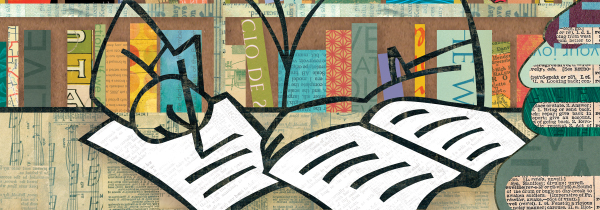 |
 |
||||||||||||||

Phantom of the Library
From the Eaton stacks, a life of lettersMy haunting began in the Tufts library.
In my senior year, having satisfied all the course requirements for my major in experimental philosophy, I was taking mostly courses that appealed to me as a fledgling playwright, which was how I ended up with an ancient Greek drama course, a modern drama course, and one titled Philosophy in Literature, nicknamed the “fat books course” for the sizable tomes we had to read at the rate of one per week—Moby Dick, War and Peace, and so on. In the Greek and phil/lit courses we were studying Aeschylus’ trilogy the Oresteia, the tale of Orestes—son of Agamemnon and Clytemnestra—who is ordered by Apollo to avenge the murder of his father at the hands of his mother and her lover. Sophocles and Euripides also wrote versions of the story, and there were several modern adaptations, including Jean-Paul Sartre’s The Flies and Eugene O’Neill’s Mourning Becomes Electra.
I had a twenty-page paper due in each of my three lit courses, and it occurred to me to write one sixty-pager instead, covering modern and ancient takes on the Orestes legend. The professors agreed to my plan, and probably giggled to themselves that I had no idea what I was letting myself in for.
I hit Eaton Memorial Library (the precursor to Wessell Library, which is now part of Tisch Library) and soon became absorbed, returning to explore my subject whenever I wasn’t in class. I liked the library’s large vaulted spaces, its sense of quiet and purposiveness, of being an oasis for busy minds, and its ability to so readily open up myriad worlds to explore. I learned the meaning of serendipity when I went into the stacks to retrieve one book and, after finding it, looked right, left, up, and down and emerged with a dozen others. Among these were poetic versions of the legend by Homer and Pindar, a half-dozen twentieth-century dramas on the subject, and—what I’d previously no idea of—Renaissance reworkings, including Shakespeare’s Hamlet, which tells an almost identical revenge-for-the-father’s-murder tale, minus Apollo for motivation.
Mastering the intricacies of the Eaton card catalogue prepared me to tackle the much more intimidating catalogue in the third-floor central atrium of the New York Public Library. I spent my spring break commuting from my family’s residence on Long Island to the vast, marbled environs that would become my second home for decades; I’m currently researching a new book there.
At the NYPL I found many of the Renaissance dramas in their original languages, and struggled through some in my Tufts-taught French and German. Each had a slightly different interpretation of the Orestes legend. I had a ball writing it all up, with plenty of material for sixty pages. I received high marks from all three faculty members. The drama professor, Jerry “Doc” Collins, went so far as to equate my work to a master’s thesis.
Researching and penning a sustained piece of nonfiction was, I now believe, what enabled me to imagine a writing career. I have since completed several dozen books, each requiring intensive research. Friends began calling me the Phantom of the Library. My pursuit of interesting information has taken me to such far-flung depots as the Boerhaave Museum in Leiden (for Absolute Zero and the Conquest of Cold), the Pequea Bruderschaft Library in Gordonville, Pennsylvania (Rumspringa: To Be or Not To Be Amish), and the American Philosophical Society in Philadelphia (Gentlemen Scientists and Revolutionaries), as well as to such research paradises as the Hoover Institution at Stanford, the American Antiquarian Society in Worcester, Massachusetts, and the archives of the French foreign office at the Quai d’Orsay.
I’ve had my share of library-centric thrills. At the British Museum, I held in my hands the diary that Robert Falcon Scott wrote as he lay dying in Antarctica and, on a later visit, the first edition of the first book to scientifically explore the field of low temperature, written by Robert Boyle in 1665. At the Boerhaave, I teased out the location of letters untouched for a hundred years, since Sir James Dewar had written them to the Dutch physicist Heike Kammerlingh Onnes, letters that solved a mystery in the field of experimentation into the ultracold. At the Hoover, I found clues to the ebullient personality and turbulent emotional life of the “longshoreman philosopher” of the fifties and sixties, Eric Hoffer, in the handwritten notebooks he’d carried in his back pockets in the 1930s as an itinerant agricultural worker.
At the Library of Congress, I had to leave the building to let out a belly laugh after discovering, in the letters of President Woodrow Wilson to his fiancée, a note addressed to her at a certain Manhattan brownstone. It was the one my wife and family and I lived in.
Some Tufts grads, when they return to campus, pay their respects to an old dorm room, a favorite classroom, or perhaps a nook where a kiss was stolen. I visit the library.
Tom Shachtman, A63, won the American Institute of Physics’ science writing award for the screenplay of a two-part Nova documentary based on his book Absolute Zero and the Conquest of Cold.